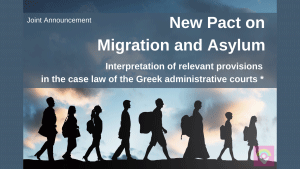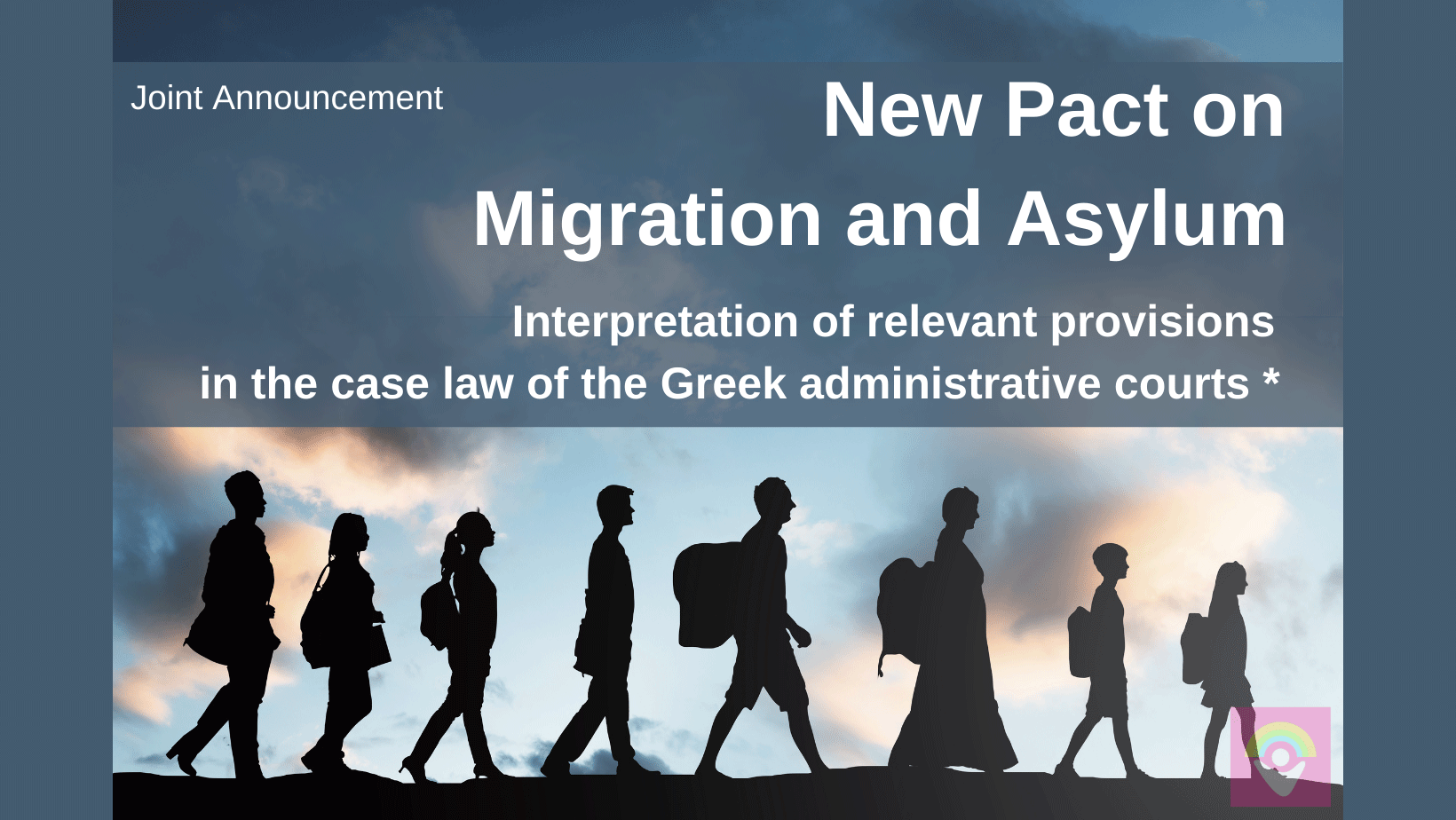 On 23 September 2020, as part of the New Pact on Migration and Asylum, the European Commission tabled legislative proposals aiming at an in-depth reform of the EU asylum acquis, in conjunction with the package of proposals presented in 2016.1
On 23 September 2020, as part of the New Pact on Migration and Asylum, the European Commission tabled legislative proposals aiming at an in-depth reform of the EU asylum acquis, in conjunction with the package of proposals presented in 2016.1
This note provides an overview of recent jurisprudence of the Greek administrative courts on the interpretation of provisions in force governing the border procedure, the suspensive effect of remedies, as well as administrative detention. The note aims to highlight legal issues and risks in the Commission proposals, with a view to contributing to the legislative process.
Download the PDF version:
https://ddp.gr/wp-content/uploads/2021/04/CEAS_CaseLawBriefing_ΕΝ.pdf
- Exemption of vulnerable persons from the border procedure
The proposal for an Asylum Procedures Regulation (APR), COM(2016) 467 and COM (2020) 611, reiterates the provisions of Article 24(3) of the Asylum Procedures Directive, according to which applications by persons in need of special procedural guarantees shall be exempted from the border procedure where “adequate support” cannot be provided.2 The concept of adequate support is not further defined in EU law, although Greek legislation sets out indicative forms such as leniency with regard to minor contradictions of the applicant, the possibility of additional breaks in the interview, and the possibility for the asylum seeker to move during the interview.3
In practice, however, Appeals Committees continue to dismiss submissions of wrong channelling of applications into the border procedure, on the ground that the vulnerable asylum seeker did not suffer procedural harm from the use of that procedure. In this respect, Appeals Committees highlight inter alia that the appellant was able to lodge an appeal against the negative decision of the Asylum Service within the deadline.4
In its judicial review case law, the Administrative Court of Appeal of Piraeus rejects the argument, put forward by the administration, that the applicant must establish procedural harm stemming from the authorities’ failure to exempt them from the border procedure due to the absence of adequate support to cover their need for special procedural guarantees. According to the Court, imposing such a burden of proof on the applicant would “result in circumventing legislative standards and to render meaningless the special treatment afforded by the legislature” to vulnerable persons in Articles 14(8) and 60(4)(f) L 4375/2016, in force until 2020.5
In a different case, the same Court highlights that the failure of the Appeals Committee to refer the applicant to the regular procedure, despite a submitted medical opinion, causes serious and irreparable procedural harm. The applicant is not offered the possibility to sufficiently prepare and does not receive adequate support during the interview, while their particular psychological state is not taken into consideration in the assessment of the application.6 The Court repeats that disregarding the applicant’s vulnerability results in circumventing the legislative standards and in rendering meaningless the special treatment afforded by the legislature to vulnerable persons.7
Importantly, the case law of the Administrative Court of Appeals of Piraeus is in line with the Court of Justice of the European Union (CJEU) interpretation of adverse procedural consequences carried by accelerated procedures,8 which applies mutatis mutandis to border procedures.
Bearing in mind the ambiguity surrounding the concept of “adequate support” and the inability of administrative authorities to define it, both legal certainty and the need to guarantee the appropriate protection foreseen by EU and Greek legislation to vulnerable asylum seekers militate in favour of a general and unequivocal exemption of such applicants from border procedures in Articles 19 and 41 APR, as was set out in Article 60(4)(f) L 4375/2016.
- Suspensive effect of asylum appeals
Recent asylum jurisprudence of the Administrative Court of Athens consistently holds that the suspension of execution of an asylum decision may not be ordered on the ground that the main judicial review remedy – known as annulment application – is manifestly well-founded, given that the examination of the grounds for annulment requires a thorough assessment of the facts of the case by the administrative court which exceeds the scope of interim judicial relief.9 Accordingly, interim relief until the completion of judicial review is granted mainly in order to prevent difficultly reparable harm stemming from the removal of the applicant from the territory pending the outcome of the annulment application.
The Court has found difficultly reparable harm to be established in cases of asylum seekers falling under categories of vulnerable persons e.g. minor children,10 single-parent families,11 persons in a fragile mental health state,12 persons undergoing gender reassignment.13 The above suggests that suspensive effect of remedies is supported by the need for compliance with the principle of non-refoulement and for provision of adequate procedural protection to vulnerable applicants. This would help prevent risks of unlawful removal of applicants pending the examination of their annulment applications.
At the same time, the Court has granted interim judicial relief for reasons of difficultly reparable harm in the case of persons whose grounds for seeking international protection were never examined on the merits in the asylum procedure due to the discontinuation of the processing of their claim as implicitly withdrawn.14 It is worth recalling that, contrary to the view in Recital 66 APR that the appellant’s right to remain on the territory is only denied in cases where the asylum application is presumed to be unfounded, the APR proposal broadens derogations from suspensive effect of appeals to a series of circumstances where the application has not been processed on the merits e.g. implicit withdrawal and inadmissibility.15 The proposal thereby introduces undue barriers to the exercise of the right to an effective remedy.
Beyond serious risks of violation of the non-refoulement principle stemming from the obligation on the appellant to separately request suspensive effect, the prohibition on suspensive effect of remedies entails disproportionate burden for judicial authorities that are already constrained by short timeframes for the processing of appeals and judicial review in the field of asylum. Administrative courts often take into consideration impending – or already conducted16 – hearings on annulment applications when offering interim relief,17 while Appeals Committees systematically dismiss suspensive effect requests as having no object (άνευ αντικειμένου) after having examined the merits of the appeal.18
- Suspension of registration of asylum applications
The proposed Regulation on addressing situations of crisis and force majeure in the area of migration and asylum, COM(2020) 613, allows Member States to derogate from the obligation to immediately register asylum applications for a period not exceeding four weeks in circumstances of crisis or force majeure.19 On the on the hand, delaying registration has no effect on “applicant for international status” under EU law,20 given that said status is acquired upon expressing the intention to seek asylum (“making” of an application), pending registration.21 However, the incorrect reading of the status as acquired upon registration and not the making of a claim persists in the case law of administrative courts.22 This creates a risk that asylum seekers will be unable to prove their status and to access their rights in the absence of relevant documentation. Such a risk carries critical consequences for their protection from refoulement and arbitrary deprivation of liberty. On the other hand, the proposal lays down a derogation regime under poorly defined circumstances of “crisis” or “force majeure”. It may therefore encourage Member States to circumvent safeguards aimed at protecting asylum seekers’ fundamental rights. In the illustrative context of blanket detention of asylum seekers in the newly established facilities of Malakasa and Kleidi, Serrres, pursuant to an unlawful suspension of the asylum procedure in March 2020 by way of emergency decree, the Administrative Courts of Athens and Serres made serious omissions and legal errors in judicial review of detention:23
- The Courts disregarded the applicants’ “asylum seeker” status, despite express reference to the fact that they had expressed the intention to seek international protection.24 They thereby disregarded the applicability of the Reception Conditions Directive provisions on detention of asylum seekers, and instead relied on pre-removal detention provisions.25
- The Courts interpreted the applicants’ entry into Greece during a period of “extremely urgent and unforeseeable need” which mandated the emergency decree, as a factor justifying detention. In some decisions, the Courts referred to the need to respond to an “asymmetrical threat” which “supersedes the underlying international and EU law rules on the asylum procedures”,26 in direct and flagrant contravention of supranational standards on the right to asylum. The same judgments incorporated the “absolute objective inability” of the authorities to process asylum applications within reasonable time into judicial review of detention, even though it does not fall within the exhaustive grounds for detaining asylum seekers under the EU acquis.27
| 22 April 2021 |
| ActionAid Hellas |
| ARSIS – Association for the Social Support of Youth |
| Danish Refugee Council (DRC) |
| CRWI Diotima |
| Equal Rights Beyond Borders |
| Fenix – Humanitarian Legal Aid |
| Greek Council for Refugees (GCR) |
| HIAS Greece |
| HumanRights360 |
| Legal Centre Lesvos |
| Network for Children’s Rights |
| Refugee Support Aegean (RSA) |
NOTES:
* Under Greek law, administrative appeals against (ενδικοφανείς προσφυγές) asylum decisions are examined by Appeals Committees, which are three-member administrative bodies composed by judges. Decisions of the Committees are amenable to judicial review (αίτηση ακύρωσης) on points of law by the administrative courts.
1 RSA, ‘New Pact on Migration and Asylum: old “recipes” with dangerous ingredients codify derogations from legality and undermine the rule of law and the rights of refugees’, 26 October 2020, available at: https://bit.ly/3c6KHSu.
2 Articles 19(3) and 41(9)(b) APR proposal.
3 Article 67(2) International Protection Act (IPA).
4 4th Appeals Committee, Decision 12645/2020, 21 July 2020, 3. In other cases, Appeals Committees have refused to assess those submissions in the context of the appeal on the basis that the applicant has not been identified as vulnerable by the competent administrative authority and that they have no competence to review the issue: 6th Appeals Committee, Decision 2411/2019, 28 February 2020, para 10. On the annulment of second instance decisions on grounds of failure to assess submissions relating to vulnerability, see also Administrative Court of Appeal of Piraeus, Decision A253/2020.
5 Administrative Court of Appeal of Piraeus, Decision Α106/2020, 21 February 2020, para 7. See also Decisions 231/2018, 558/2018, 563/2018 and 642/2018.
6 Administrative Court of Appeal of Piraeus, Decision Α54/2021, 11 February 2021, para 9.
7 Ibid.
8 CJEU, Case C-404/17 A v Migrationsverket, 25 July 2018, para 31, where the Court noted that asylum seekers in accelerated procedures are at a disadvantage compared to the regular procedure, inter alia due to the lack of suspensive effect of appeals.
9 Administrative Court of Athens, Decision 113/2020, 11 March 2020; Decision 317/2020, 12 August 2020; Decision 384/2020, 21 September 2020; Decision 405/2020, 30 September 2020; Decision 411/2020; Decision 438/2020, 14 October 2020; Decision 19/2021, 20 January 2021.
10 Administrative Court of Athens, Decision 317/2020, 12 August 2020, para 5; Decision 113/2020, 11 March 2020, para 4.
11 Administrative Court of Athens, Decision 405/2020, 30 September 2020, para 5; Decision 19/2021, para 3.
12 Administrative Court of Athens, Decision 438/2020, 14 October 2020, Decision 405/2020, 30 September 2020, para 5; Decision 19/2021, 20 January 2021, para 3.
13 Administrative Court of Athens, Decision 411/2020, paras 4-5.
14 Administrative Court of Athens, Decision 113/2020, 11 March 2020, para 4.
15 Article 54(3) APR proposal.
16 Administrative Court of Athens, Decision 438/2020, 14 October 2020, para 4.
17 Administrative Court of Athens, Decision 317/2020, 12 August 2020, para 6; Administrative Court of Thessaloniki, Decision 88/2020, 19 May 2020, para 7.
18 See 4th Appeals Committee, Decision 12645/2020, 21 July 2020; 6th Appeals Committee, Decision 5692/2020, 28 February 2020; 10th Appeals Committee, Decision 7465/2020, 24 April 2020; 13th Appeals Committee, Decision 2727/2020, 9 April 2020; 13th Appeals Committee, Decision 18422/2020, 21 September 2020; 14th Appeals Committee, Decision 4334/2020, 9 April 2020; 19th Appeals Committee, Decision 19883/2020, 11 August 2020.
19 Articles 3(5), 6 and 7(1) Crisis Regulation proposal.
20 Article 2(c) Asylum Procedures Directive; Article 2(b) Reception Conditions Directive; Article 2(h) Qualification Directive; Article 65(8) IPA.
21 CJEU, Case C-36/20 VL v Ministerio Fiscal, 25 June 2020, para 92.
22 Administrative Court of Rhodes, Decision ΑΡ677/2020, 17 November 2020, para 4.
23 Administrative Court of Serres, Decisions 11/2020 to 13/2020, 1 April 2020; Administrative Court of Athens, Decisions 356/2020 to 360/2020, 3 and 7 April 2020.
24 Administrative Court of Athens, Decisions 358/2020 to 360/2020, 7 April 2020, para 4.
25 CJEU, Case C-36/20 VL v Ministerio Fiscal, 25 June 2020, paras 95 et seq.
26 Administrative Court of Athens, Decisions 358/2020 to 360/2020, 7 April 2020, para 4; Administrative Court of Mytilene, Decision ΑΡ73/2020, 20 March 2020, para 4.
27 See mutatis mutandis CJEU, Case C-36/20 VL v Ministerio Fiscal, 25 June 2020, paras 106-107.





